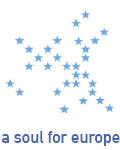A Soul for Europe Conference 2017
Preparatory Material
Find links to relevant contributions from our online debate for each workshop and read Volker Hassemer’s introduction here.
Have a look at Elmar Brok’s article ‘It is time for European citizens to take ownership of the European Union’ that serves as preparatory material for all workshops or find Collected Key Statements from the Online Debate, that provides a summary of the whole online-debate.
A Soul for Europe Conference 2017: Preparatory Material
Find links to relevant contributions from our online debate for each workshop and read Volker Hassemer’s introduction here.
Have a look at Elmar Brok’s article ‘It is time for European citizens to take ownership of the European Union’ that serves as preparatory material for all workshops or find Collected Key Statements from the Online Debate, that provides a summary of the whole online-debate.
Topic 1: Cities for Europe
11:00
– 12:30
Hall 1
How Can Cities and Citizens Strengthen Europe?
Organisation: Cities for Europe
Format: Introduction and statements; presentation of 6 project examples from the European Marketplace
Active participants: Karl-Heinz Lambertz, President Committee of the Regions, Emil Boc, Mayor Cluj-Napoca, Michael Cramer, MEP; project representatives: Volker Hassemer, Chairman Stiftung Zukunft Berlin; Hella Dunger-Löper, former State Secretary
Host: Brigitte Russ-Scherer, former mayor
This workshop starts with an input on “How do cities realize their responsibility for Europe and what changes do we need?” Selected initiatives will present their projects before the discussion is opened to the public.
Preparatory material:
Michael Cramer: Europe and the future of mobility
- More and more cities start to realise the great potential of an efficient public transport system and smart investments in bicycle infrastructure.
- The European Union has great potential to lead the world community on this path. If we succeed in becoming a credible role model for climate protection worldwide, we can motivate other states to follow our lead but also serve them with consistent best practice experience.
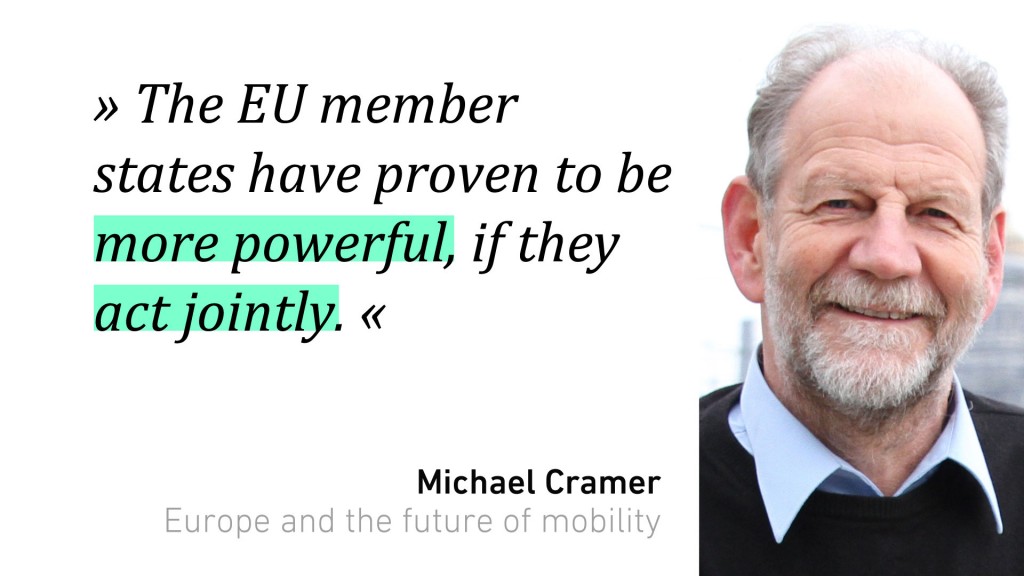
Petra Kammerevert: Who will assume responsibility in Europe?
- What we need is a Europe that stands for its citizens — a Europe that is shaped and experienced directly in communities.
- In the medium term, every young European has to have the opportunity, at least once, to participate in one of the ERASMUS+ projects, regardless of the parents’ financial situation.
- European citizens have to become more integrated in political processes and also become the focus of European policy
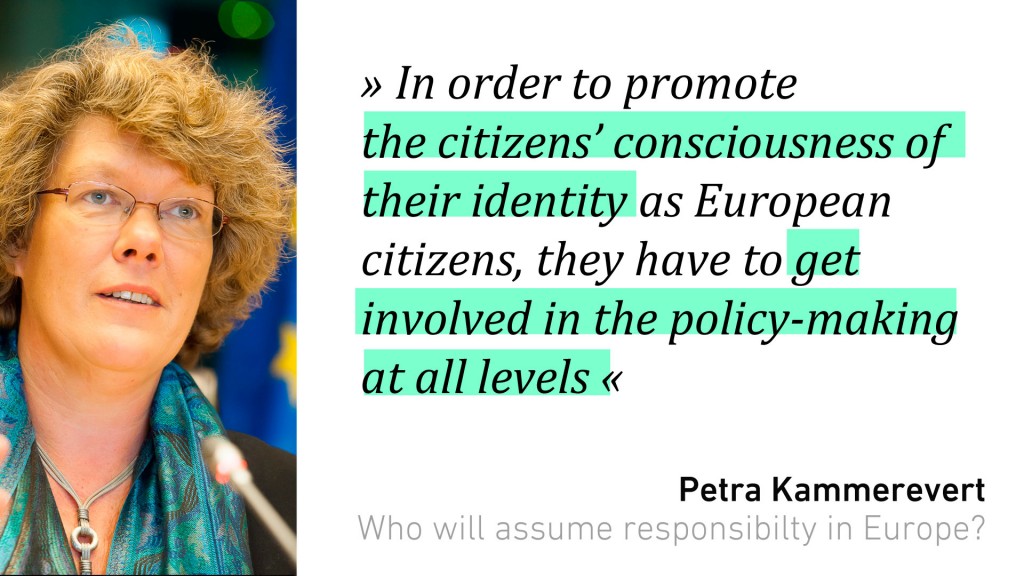
Hella Dunger-Löper: Affirming one’s history — towards a European identity
- The future lies in cities with their economic power, productivity, potential and infrastructure for a knowledge society.
- It is only histories that are recognized and felt together and common traditions and experiences that lead to a shared sense of identity and solidarity, closeness, affinity and home.
- The responsibilities for the process to be successful involve an interplay between the local and the European.
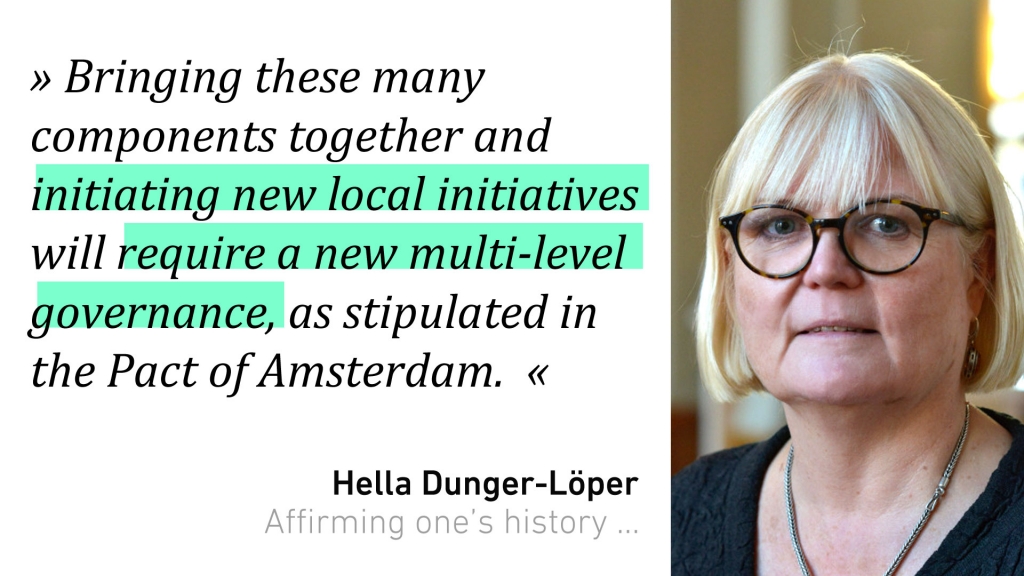
Michaela Kauer: Experiment with potential for renewal
- The European Commission has to involve the local level of government in the context of partnership, (…), and the member states will have to relinquish powers in both directions, whether they wish to or not.
- The EU Urban Agenda must outgrow its project status.
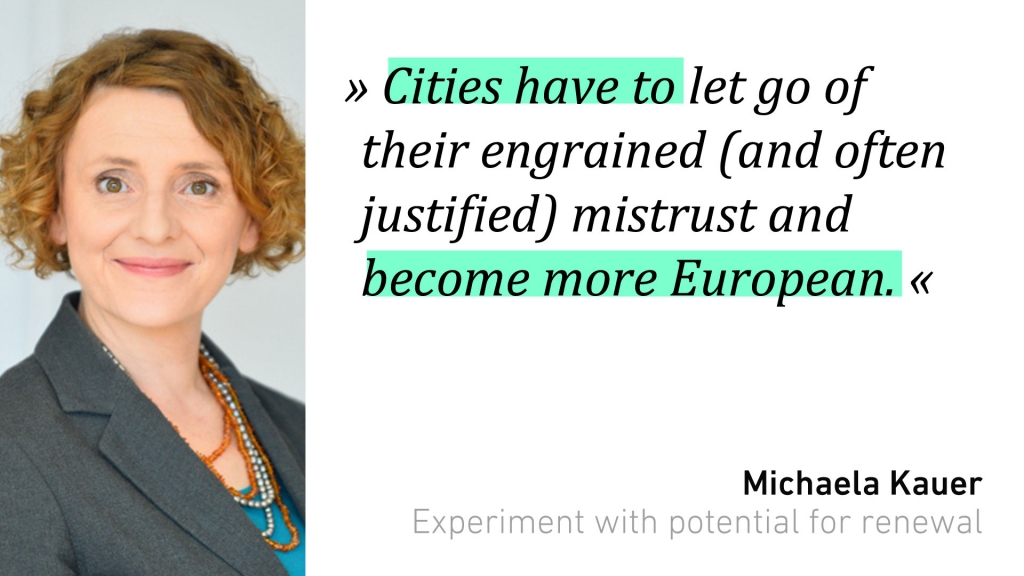
Rüdiger Kruse: The Europe of cities
- Cities face similar challenges, regardless of the respective nation. For instance, integration succeeds or fails in cities.
- Europe will not be a Europe of cities or of nations; it will have to be a Europe of citizens if it is to enjoy a future
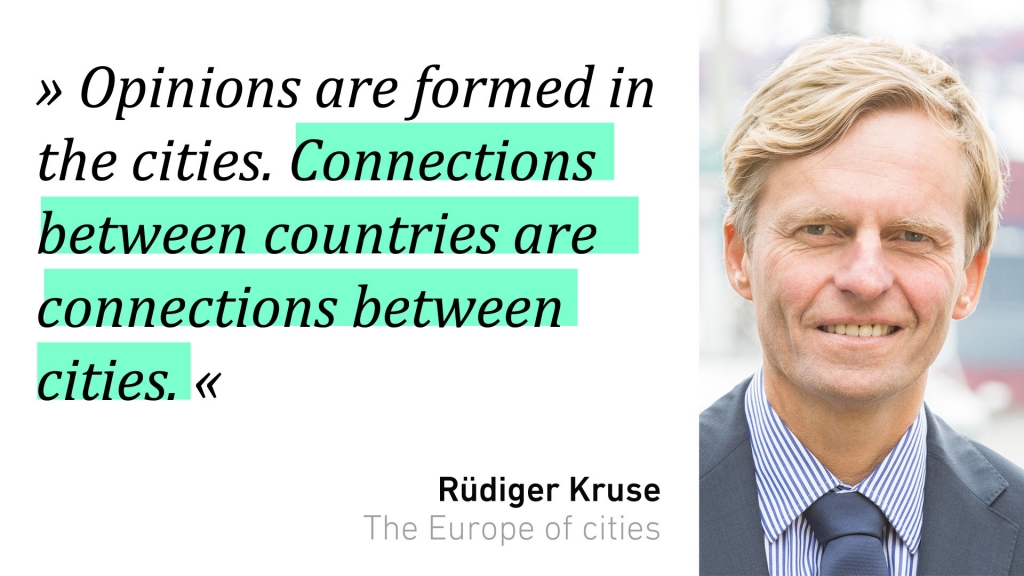
Topic 1: Cities for Europe
11:00 – 12:30 | Hall 1
How Can Cities and Citizens Strengthen Europe?
Organisation: Cities for Europe
Format: Introduction and statements; presentation of 6 project examples from the European Marketplace
Active participants: Karl-Heinz Lambertz, President Committee of the Regions, Emil Boc, Mayor Cluj-Napoca, Michael Cramer, MEP; project representatives: Volker Hassemer, Chairman Stiftung Zukunft Berlin; Hella Dunger-Löper, former State Secretary
Host: Brigitte Russ-Scherer, former mayor
This workshop starts with an input on “How do cities realize their responsibility for Europe and what changes do we need?” Selected initiatives will present their projects before the discussion is opened to the public.
Preparatory material:

Michael Cramer: Europe and the future of mobility
- More and more cities start to realise the great potential of an efficient public transport system and smart investments in bicycle infrastructure.
- The European Union has great potential to lead the world community on this path. If we succeed in becoming a credible role model for climate protection worldwide, we can motivate other states to follow our lead but also serve them with consistent best practice experience.
Petra Kammerevert: Who will assume responsibility in Europe?
- What we need is a Europe that stands for its citizens — a Europe that is shaped and experienced directly in communities.
- In the medium term, every young European has to have the opportunity, at least once, to participate in one of the ERASMUS+ projects, regardless of the parents’ financial situation.
- European citizens have to become more integrated in political processes and also become the focus of European policy
Hella Dunger-Löper: Affirming one’s history — towards a European identity
- The future lies in cities with their economic power, productivity, potential and infrastructure for a knowledge society.
- It is only histories that are recognized and felt together and common traditions and experiences that lead to a shared sense of identity and solidarity, closeness, affinity and home.
- The responsibilities for the process to be successful involve an interplay between the local and the European.

Michaela Kauer: Experiment with potential for renewal
- The European Commission has to involve the local level of government in the context of partnership, (…), and the member states will have to relinquish powers in both directions, whether they wish to or not.
- The EU Urban Agenda must outgrow its project status.
Rüdiger Kruse: The Europe of cities
- Cities face similar challenges, regardless of the respective nation. For instance, integration succeeds or fails in cities.
- Europe will not be a Europe of cities or of nations; it will have to be a Europe of citizens if it is to enjoy a future
